Roel van der Velde (@RoelVelde) of the School of Languages and Area Studies, University of Portsmouth, explores how the outcomes of this event can be of benefit to students of Francophone history. He is presently in the final stages of his doctoral thesis on ‘French-South African arms trade as a community of practice, 1955-1979’.
On 5 June 2017, a heavy congregation of military historians convened at Kings College for the ‘War in Historical and Contemporary Perspective’ conference. The conference aims were to make an inventory of developments and innovations within the discipline in a dynamic new century.
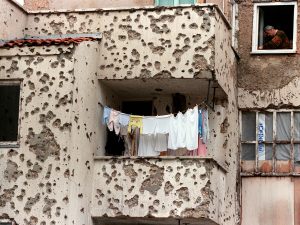 This piece contends that researchers of French-Francophone relations can benefit from these discussions. War Studies, with its roots in military history, is in need of a robust research agenda in support of interdisciplinarity, an issue it has in common with Area Studies. At a similarly introspective conference it was observed that Area Studies ‘cannot be grounded in the significance of specific geographical areas. All ‘areas’ are historically contingent, with fluid and often contested boundaries; their very coherence as areas – whether geopolitical, socio-economic, or cultural-historical – shifts over time, often depending upon the perspective of who is viewing, from where, and for what purpose.’.[i] Furthermore, both disciplines share a connection with societal ‘impact’ especially in questions of regional stability and security. Indeed, within the Francophone research cluster relations between French and British African policies have been appreciated as a key area of policy relevance. With the Cold War now more than 25 years behind us, the trend is towards more transitory and cooperative forms of research. Especially in the field of conflict, the legacies and effects of African decolonization with its concomitant feature of small and transnational wars, are being rediscovered, as it were. , In the wake of Western military interventions there, and the latest senseless and horrific attacks by home-grown terrorists on innocent people, in London only two days before the conference, War Studies is not alone in reassessing the historical contexts of conflict.[ii]
This piece contends that researchers of French-Francophone relations can benefit from these discussions. War Studies, with its roots in military history, is in need of a robust research agenda in support of interdisciplinarity, an issue it has in common with Area Studies. At a similarly introspective conference it was observed that Area Studies ‘cannot be grounded in the significance of specific geographical areas. All ‘areas’ are historically contingent, with fluid and often contested boundaries; their very coherence as areas – whether geopolitical, socio-economic, or cultural-historical – shifts over time, often depending upon the perspective of who is viewing, from where, and for what purpose.’.[i] Furthermore, both disciplines share a connection with societal ‘impact’ especially in questions of regional stability and security. Indeed, within the Francophone research cluster relations between French and British African policies have been appreciated as a key area of policy relevance. With the Cold War now more than 25 years behind us, the trend is towards more transitory and cooperative forms of research. Especially in the field of conflict, the legacies and effects of African decolonization with its concomitant feature of small and transnational wars, are being rediscovered, as it were. , In the wake of Western military interventions there, and the latest senseless and horrific attacks by home-grown terrorists on innocent people, in London only two days before the conference, War Studies is not alone in reassessing the historical contexts of conflict.[ii]
This conference was a great treat for me, after completing my draft doctoral thesis on French arms trade to South Africa. After years of delving into French policies and comportment in Africa, it would be a welcome return to the ‘pure’ study of military affairs that had filled my Bachelors and Masters degrees. The actually existing study of war amounts to a grab bag of disparate topics cobbled together from a variety of disciplines and sources.[iii] (Barkawi, 2011:130) This is part and parcel of the progress the discipline has made in the field, away from studying victory and defeat. The conference ‘Crossing Borders: Technology and Migration in an Interconnected World’, held in March 2017 by Kings College’s Conflict, Security and Development research group may serve as an example of this. The ‘War in Perspective’ conference was a large and vocal assembly of military historians, interdisciplinary to a fault, but with allegiance to the old craft of studying past battles. A pessimist would say that little has changed. This would be wrong; as the reader will see, new influences are actively being incorporated by new scholarship. The conference kicked off with a keynote speech by Dr Michael Finch, who sketched the familiar development of the discipline’s (British) institutions in the 20th century. There was never a ‘Golden Age’ of military studies. The approach was long orphaned, and burdened by outsiders with a stigma of conservatism and glorifying war. The keynote was quickly assailed by the audience for being ‘too Atlantic’, ‘too Oxbridge’, and not connecting with IR. This response actually went to underline Dr Finch’s key point that ‘labels matter’. And so the old definitional debate about the core of the discipline reignited, problematizing for the duration of the conference the ontology of war, the need to engage with new methods and insights from other disciplines, while at the same time maintaining what is believed to be the core of military history. It was noted that on the mainland, interdisciplinary war studies is much less definitional in its approach and more prone to conferring with other stakeholders. In short, the principal theme throughout the day was how to comprehensively marry the study of war’s conduct to the effects that war has on society.
The conference featured three panels of three papers each: the first on lacunae of history writing on War, a second on the conceptions underlying the history of war, and a last panel by different practitioners of war history. The first panel covered examples of new interdisciplinary work. Dr Erica Charters unpicked the tacit assumptions of Eurocentric state logics and civility regarding 18th century warfare and the Enlightenment that still today persist in the lexicon of humanitarian intervention. In-depth longitudinal studies can provide greater clarity, but such research was found to suffer from REF frameworks and the sparse attention given to historical conflict in other disciplines. Equally, it was recognized that the discipline of military history has relished its specialization. Indeed, Charters herself asserted the truism that ‘operational military history’, the lessons of warfighting, remains the bread and butter of the study of war. Dr Charters was followed by Dr Selena Daly. Daly has studied Italian migrations in the First World War, taking a transnational perspective that targets the large peripheral diaspora of ‘unofficial empire’, away from national armies on the main battlefields, and the 30,000 Italian colonists in East Africa. Here the seemingly mundane point of foreign language was wholeheartedly endorsed by Dr Daly, who noted with concern the decline of language skills in British education, and evidently also within the discipline. The blurring of boundaries was a cue for Professor Alex Watson, discussing the context of the understudied East & Central European Fronts of World War 1. Watson noted the short memories of the more casual analyses of its origins. By fixating on the wartime period, the longer shadows of migration, ethnic cleansing and national identities have been left isolated from the conflicts which put them in relief. The ‘longue durée’ of the Habsburg Empire and the WW1 origins of the idea of ‘Lebensraum’ are examples. In this respect, War studies finds itself dependent on other research and sources for additional contexts. This is a reciprocal problem. For example, the OAS is easily pigeonholed as a collection of ‘militants’ or radical anti-communists for their violence and terrorism, but they should be understood first and foremost as military men.[iv]
The second panel took on the conceptual understanding of war, inside and outside of the war studies discipline. The first speaker, Dr Tarak Barkawi, returned to the definitional question he had explored in an article in 2011. In it he argued that scholarship had separated war from peace as an aberration, a downfall, leading to an artificial and normative division of conduct and outcomes of war. Working from that premise, he assumed war and peace as interwoven, whereby ‘we are able to move from ‘‘war and society’’ to ‘‘war in society’’: to now focus anew on the multiple traces of war’s generative powers and their function in the production of social and political orders.” Instead, war is understood by non-military scholars as ‘an ethical and legal challenge’ to ‘a mostly pacific universe’.[v] To escape such narrow conceptualisations – including that of operational history – Barkawi argued for a theory of war which would emphasize its creative social power. Effectively a nod to Watson, he argued that the “history of war” could then be incorporated in the much broader past of war. Not dissimilar to the postcolonial v post-colonial debate, Barkawi’s point is echoed in the French ‘failure of collective memory’ of the Algerian War, which ironically led to much creative writing by non-historians on the subject.[vi] The practice of history after all exists in the tensions between ‘being truthful to history and being faithful to memory’, involving deliberate negotiations on method, but also on what is excluded.[vii]
The historian’s bread and butter is of course filling the gaps of historical continuity. Representing a continuum of peace and war may cause new patterns and temporal breaks to be obscured. Dr Jonathan Fennell argued that ‘pure’ sequential history-writing should be accompanied by applied history-writing, understood as the study of the past through historic analogies. Analogies can be used to detect change, the all-important factor in explaining failures in military adaptation. As an example of change hiding behind assumed continuity, as well as the relevance of the military experience to non-military social relations, professor and psychiatrist Simon Wessely illustrated lagging professional understandings of stress after trauma. The use of the word ‘shellshock’ was considered as undermining morale as late as 1939, and acceptance of soldiers’ limitations only set in after World War Two. According to Wessely, modern psychiatry remains largely oblivious to its wartime origins. Immediate debriefing of trauma victims by “trained counsellors” was adopted in defiance of wartime experiences showing the adverse effect that practice had on victims. Of course, a reluctance to engage with the destructive effects of war on society persists also in historical justifications of British counter-insurgency warfare, conceived in colonial times as using ‘minimum force’.[viii] A further connection to a point by Charters of biased ‘othering’ of opponents and spaces in the present day neatly coincides. Lastly, as Wessely pointed out, mythmaking was in evidence in the film Warriors (1999) about British intervention in former Yugoslavia. The movie’s ending suggested that combat duty invariably generated PTSD, whereas statistics show this to be a gross exaggeration, although numbers remain significant.[ix]
It will be clear that no one type or perspective suffices to singlehandedly capture the thoroughly invasive character of war. This includes the perspective of practitioners, a point abundantly made by the third panel. Different markets placed specific demands and priorities on those providing the historical products. Michael Watson of Cambridge University Press, and Dr Peter Johnson of the National Army Museum demonstrated how publishing houses and national museums face pressures and expectations of largely national audiences, limiting the scope for alternative perspectives. Powerfully, Ms Anna Brinkman, Research Student at the Studies Department pointed the finger at a largely male audience, giving clear examples of gender inequality within War Studies. Arguably a good balance was struck on the composition of the panels on the day, but generally conference organisation disfavouring female participants was a good example of gender bias in academia. Lip service to such messages won’t help, Brinkman reminded us, and male historians need to speak up for their office colleagues – which again connected nicely with the conference theme of changing practices. Closing remarks were made by War Studies doyen Sir Hew Strachan. He connected military history to its theorizing ally, strategic studies. Strachan regretted the theoretical turn of Strategic Studies, and the concomitant subordination of historical analysis to convenient political stratagems. Strachan put fire to the notion that strategic innovations make redundant military history, as illustrated by the reception of the nuclear bomb, of cyber warfare and of counterinsurgency doctrines. Algeria, he argued, is not the same as Iraq. History teaches that the particular contexts must be remembered, when making otherwise legitimate historical extrapolations to present situations. History is not simply about yesterday’s teachings for tomorrow, its real value lies in explaining change, how yesterday differed from the day before.
From these discussions, some noteworthy points emerge. New agendas within War Studies and Strategic Studies continue to reach out from their core activity and geography of explaining armed conflict. Excellent interdisciplinary work on military history has been done, but it has not led to a full reconciliation of the core field of understanding past battles with other areas, or even a clear-cut way of aligning with understandings of conflict by other schools of history and disciplines of social science. The stigma lingers on; Military History is still predisposed to operational questions, bounded by an Anglophone experience, which hinders connections with other fields of social study. Strategic Studies is sometimes her false friend, subordinating military history to general conceptualisations. Nonetheless the scope for greater cooperation is obvious.
Non-military fields tend to view war as an aberration and its military actors as guided by (or separate from) the political levels placed above them. Military perspectives offer a more fluid view of peace and war, and critically engage with long trajectories of conduct in both dimensions. Military history also points to the instrumentalisation of war – the subordination of all social activity to victory, which tends to overshadow and trivialize continuities with the ordinary. Elsewhere, this point has been made in relation to the understudied topic of peacekeeping in francophone African states.[x] The Francophone linguistic and historical institutions in Africa remain powerful contexts for a host of present day policies, national and regional, as the nature of its longstanding presence there has changed, but not disappeared. Here, War Studies expertise provide many opportunities for mutual consultation. Most fruitful seem to be those conjoining areas of study of where the complex societal impact of conflict meets the necessity to employ imperfect state military expertise, an age-old problem taking on new form. Post-Cold War conflicts have become increasingly complex for a variety of reasons and have moved beyond the control of even the strongest states, who nonetheless are called upon to respond, unilaterally or jointly. This development creates a need to critically engage with, and widen the scope and contexts of, state interventions. Occupying a key part of the (African) research landscape, Francophone Studies can contribute innovative contexts in which military knowledge can flourish.
[i] University College London, Conference ‘Area Studies in the 21st Century’, 9-10 November 2015, https://www.ucl.ac.uk/ssees/centenary/documents/areastudiesin21century.pdf
[ii] H. Stuart, Islamist Terrorism: Analysis of Offences and Attacks in the UK (1998–2015), The Henry Jackson Society, 2017. Key Findings and Analysis are on http://henryjacksonsociety.org/wp-content/uploads/2017/03/Islamist-Terrorism-key-findings-and-analysis.pdf
[iii] T. Barkawi and S. Brighton, ‘Powers of War: Fighting, Knowledge, and Critique’, International Political Sociology, (2011) 5, p.130.
[iv] A. Bouchène, J.-P. Peyroulou, O. Siari-Tengour, T. Khalfoune, G. Meynier, Histoire de l’Algérie à la période coloniale, 1830-1962 (Paris: La Découverte, 2014), p.642.
[v] T. Barkawi and S. Brighton, ‘Powers of War’, ibid., pp.139-142.
[vi] Lindsay Kaplan, ‘Talking Through Taboo : The Othering of the Algerian “Problem ” in Jean-Louis Bory’s “All Of Woman Born”‘, in Natalia Starostina, Between Memory and Mythology (Cambridge Scholars Publishing, 2014), p.107.
[vii] S. Davidson, Ricoeur Across the Disciplines, (Bloomsbury Publishing PLC, 2010), ProQuest, p.77-81
[viii] T.R. Mockaitis, The minimum force debate: contemporary sensibilities meet imperial practice, Small Wars & Insurgencies (2012) 23:4-5, 762-780.
[ix] For example, James O. E. Pittman, et al. “Post-Traumatic Stress Disorder, Depression, and Health-Related Quality of Life in OEF/OIF Veterans.” Quality of Life Research, vol. 21, no. 1, 2012, pp. 99–103. JSTOR, www.jstor.org/stable/41411315, p.99, quoting a range of 2-10%.
[x] B. Charbonneau and T. Chafer, Peace operations in the francophone world: Global governance meets post-colonialism. (London: Routledge, 2014), p.9

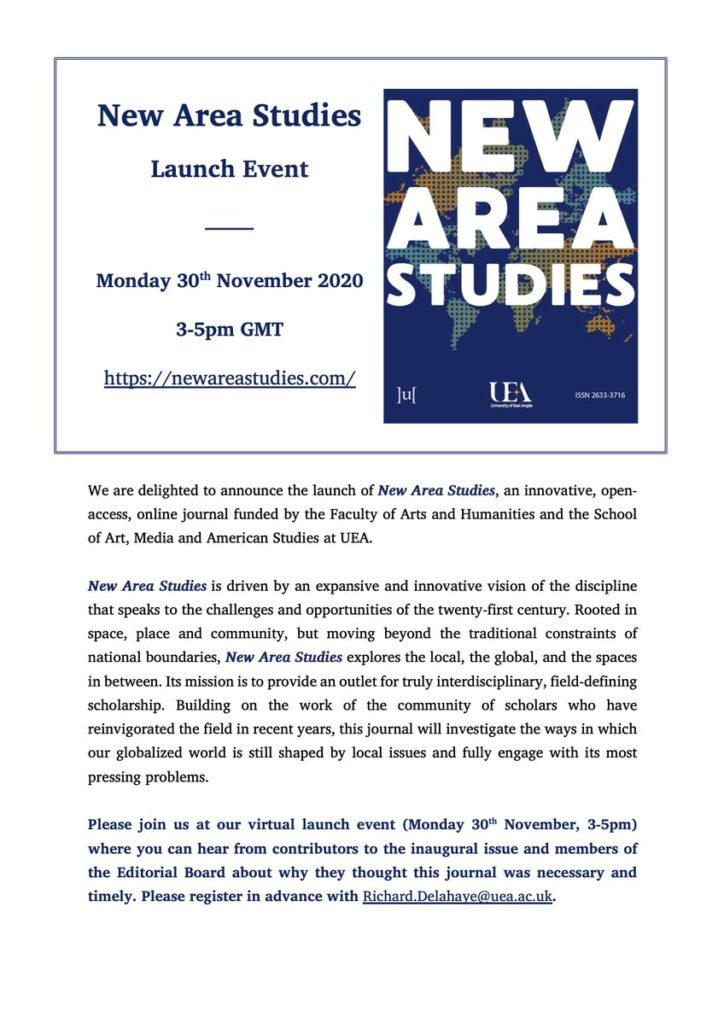
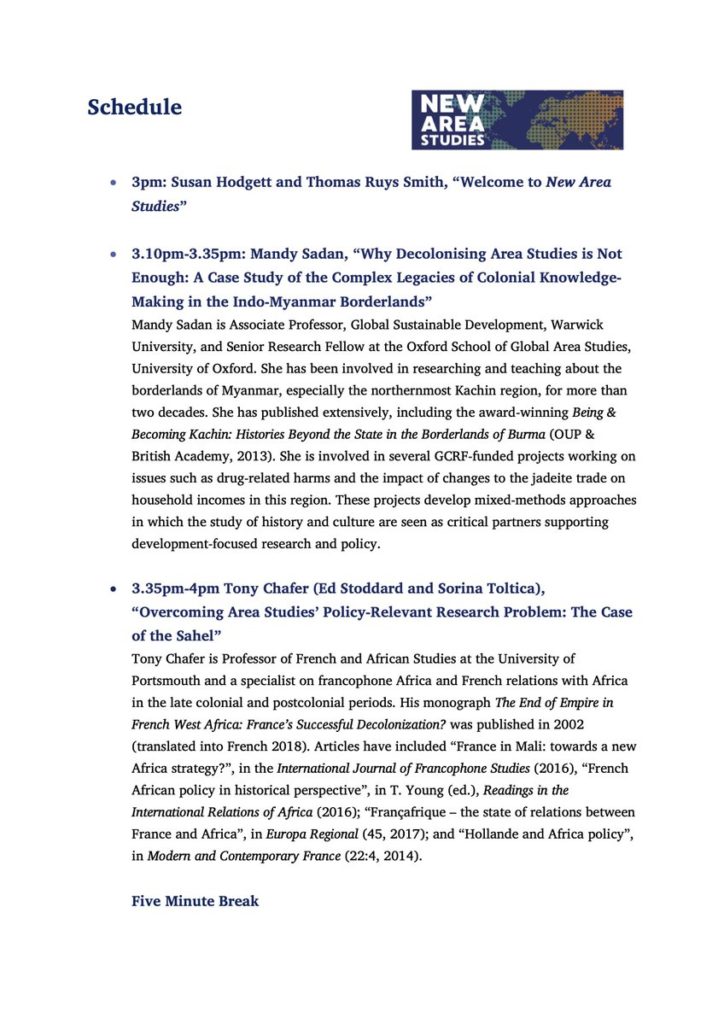
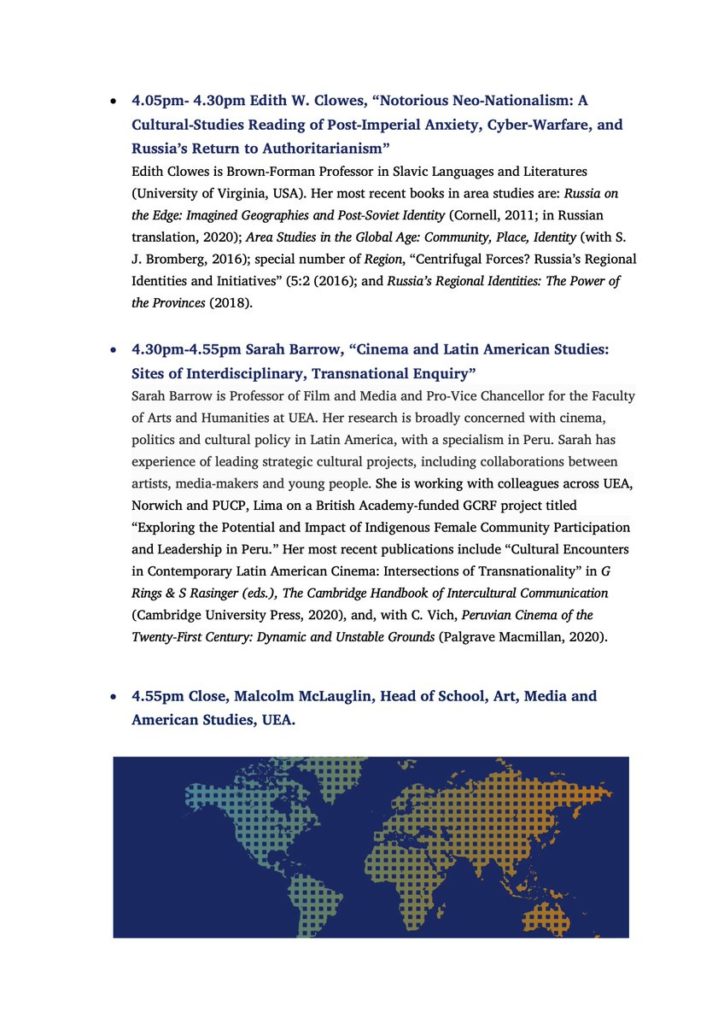
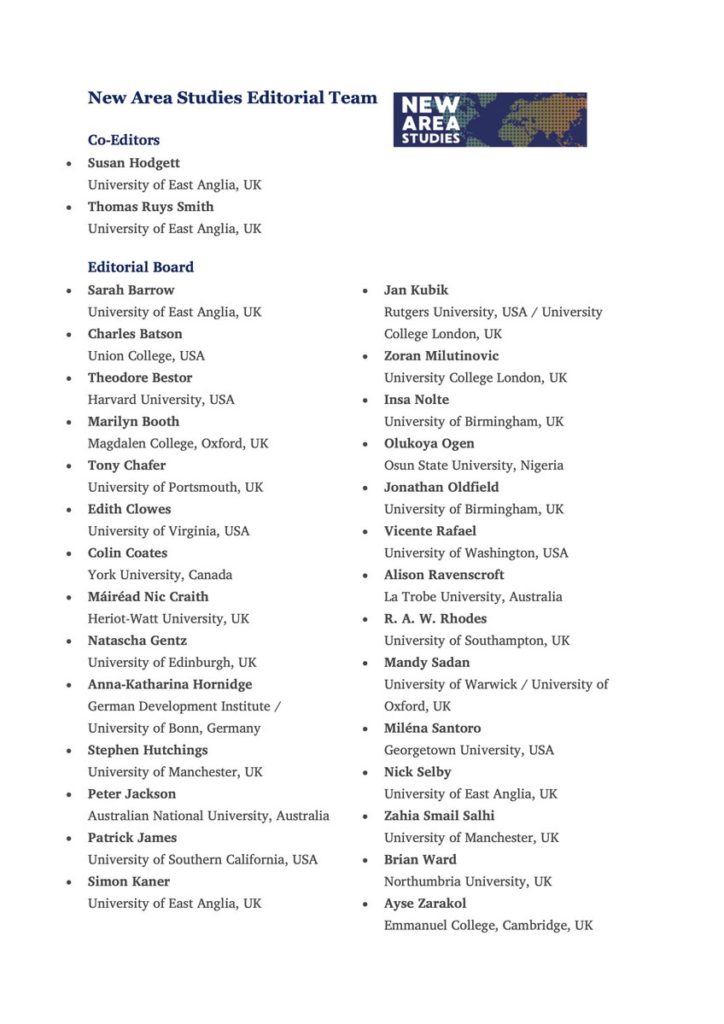
 This piece contends that researchers of French-Francophone relations can benefit from these discussions. War Studies, with its roots in military history, is in need of a robust research agenda in support of interdisciplinarity, an issue it has in common with Area Studies. At a similarly introspective conference it was observed that Area Studies ‘cannot be grounded in the significance of specific geographical areas. All ‘areas’ are historically contingent, with fluid and often contested boundaries; their very coherence as areas – whether geopolitical, socio-economic, or cultural-historical – shifts over time, often depending upon the perspective of who is viewing, from where, and for what purpose.’.
This piece contends that researchers of French-Francophone relations can benefit from these discussions. War Studies, with its roots in military history, is in need of a robust research agenda in support of interdisciplinarity, an issue it has in common with Area Studies. At a similarly introspective conference it was observed that Area Studies ‘cannot be grounded in the significance of specific geographical areas. All ‘areas’ are historically contingent, with fluid and often contested boundaries; their very coherence as areas – whether geopolitical, socio-economic, or cultural-historical – shifts over time, often depending upon the perspective of who is viewing, from where, and for what purpose.’.